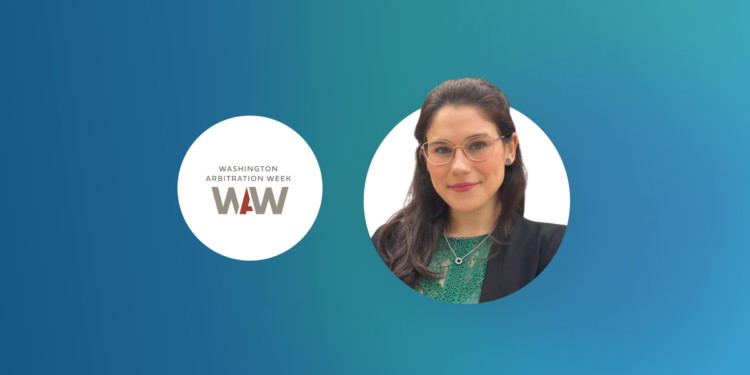THE AUTHOR:
Carolina Müller Magalhães, LL.M candidate at Georgetown University
The fourth panel of the 2023 Washington Arbitration Week (WAW), “Technology Panel: Artificial Intelligence and New Gadgets for International Arbitration”, explored how AI can be helpful to the arbitration practice.
The panel was moderated by Dmitri Evseev (Arbitration City), with panelists Catalina Brito (Greenberg Traurig LLP), Kelby Ballena (Allen & Overy), Elizabeth Chan (Tanner De Witt), and Luis M. Martinez (International Centre for Dispute Resolution).
Catalina Brito started the discussion by sharing her experiences using two platforms, “Chat AGT” and “Casetext”. She explained that Chat AGT (not to be confused with Chat GPT) is an AI platform designed for use within firms to assist attorneys by organizing ideas and summarizing and translating documents. All data used and generated is directly saved in the firm’s cloud, ensuring the confidentiality of client information.
Another AI-powered resource for lawyers is Casetext, which uses AI to identify the legal issues presented and the case law used, making connections with other related cases. It also serves as a tool for legal research and drafting. While Casetext appears extremely helpful for litigation and is only focused on US law, Ms. Catalina expressed her belief that these platforms will continue to evolve and become increasingly available for arbitration matters.
Kelby Ballena highlighted that technology can be a double-edged sword. To illustrate this point, he shared his experience using different AI platforms to create his presentation.
Using Adobe Firefly, Mr. Ballena generated images and emphasized the crucial role of understanding a system’s language to achieve the desired results. Minor changes in input led to significantly different results, highlighting the “experience of understanding” shared between the user and the platform. Next, he explored Jus Mundi’s JusAI platform, which is still in the test phase. Mr. Ballena used JusAI to generate an automated summary of a final award in a trademark-related dispute. The generated summary had some peculiarities, omitting the merits aspects of the dispute and perhaps misclassifying the original trademark case as a rubber and plastic products case. Despite being in the test phase, Mr. Ballena indicated that the tool can already be very useful at this stage. Through these illustrations, it was clear that using generative AI requires an understanding of the platform to achieve the desired outcome.
Elizabeth Chan discussed the application of AI in non-work and work settings. She structured her analysis in three points: Mindset, Chat GPT, and practical use cases of AI.
On Mindset, Ms. Chan emphasized that utilizing AI platforms can enhance productivity if we view the platforms as assistants to whom work can be delegated. She stressed the importance of understanding the limitations of AI tools and promoted the safe and responsible use of AI. On Chat GPT and practical use cases of AI, she provided a list of potential use cases for lawyers:
- Task approach
- Legal research
- Problem-solving
- Ideation and counterargument generation
- Writing assistance
- Event organization
- Virtual content production
- Drafting social media posts
Ms. Chan concluded by encouraging practitioners to explore available AI tools, emphasizing the significance of learning to effectively integrate them into various aspects of life early.
Luis M. Martinez discussed the integration of technological advancements at the American Arbitration Association – International Centre for Dispute Resolution (“AAA- ICDR”). Given the substantial number of cases that the AAA-ICDR manages, there is a necessity to develop proprietary technology to manage the cases efficiently. He highlighted that the AAA-ICDR has a culture of embracing innovation. In this respect, the partnership with Jus Mundi to publicize the AAA-ICDR’s redacted awards is an important initiative in a world where companies are exploring the value of predictive analytics. According to the AAA-ICDR Arbitration Rules 2021, awards can be published if they become public or if the parties do not object within a certain period. However, only six awards have been sent to Jus Mundi, and the parties did not object to publicizing their redacted versions.
Nevertheless, he noted that Jus Mundi has collected over 1,000 AAA-ICDR awards that were obtained because they became public. A limited data pool poses challenges for effective predictive analytics, but Martinez recognized that recent initiatives for publication lead to improvements in this respect. Mr. Martinez concluded by noting that AAA has recently issued guidance for arbitrators on the use of AI in international arbitration. Among AAA’s core concerns are confidentiality, competence, and fairness.
Conclusion
Overall, the panel explored the latest advancements and functionalities of AI tools, focusing on their application in the practice of international arbitration. All panelists expressed that AI tools are designed to assist and will continue to evolve, requiring an adaptive approach to the law practice in the coming years.
ABOUT THE AUTHOR:
Carolina Müller Magalhães is a Brazilian-qualified lawyer and an LL.M student and Merit Scholar at Georgetown University. She is the Lead Event Organizer at Georgetown International Arbitration Society, and for the past three years, she has exclusively worked with arbitration.






